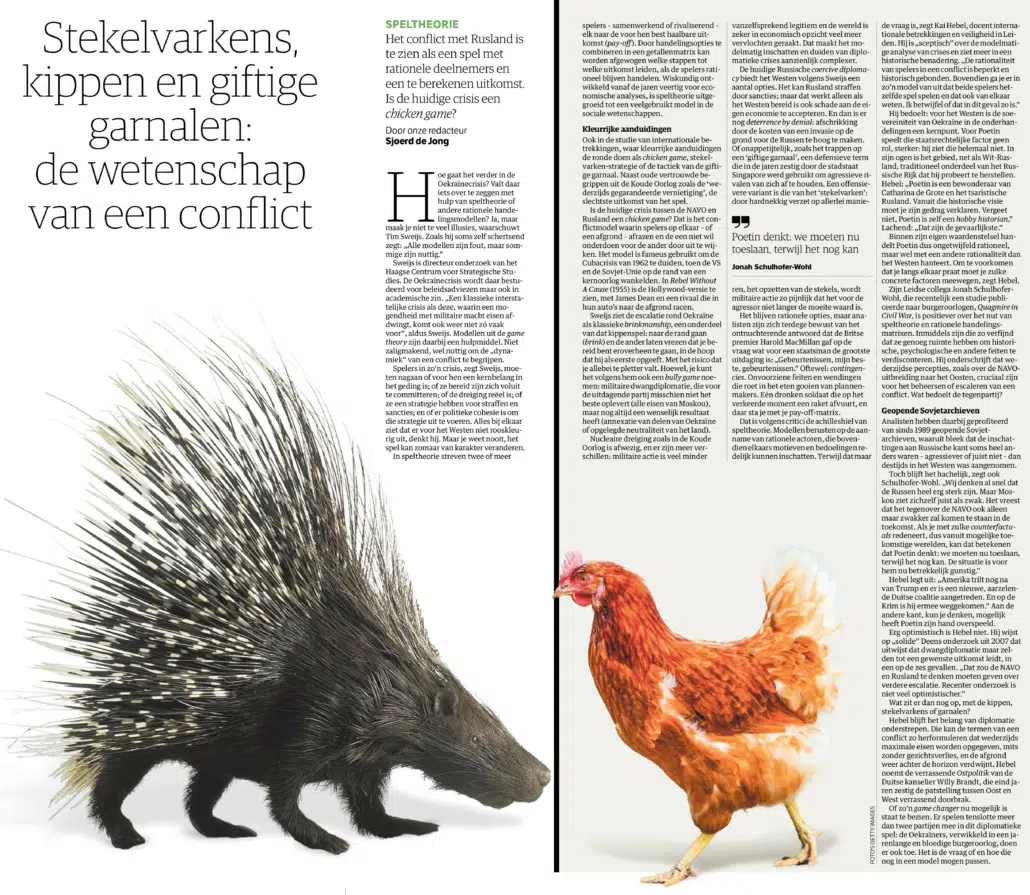Hoe gaat het verder in de Oekraïnecrisis? Valt daar iets over te zeggen met hulp van speltheorie of andere rationele handelingsmodellen? Ja, maar maak je niet te veel illusies, waarschuwt Tim Sweijs in een artikel van Sjoerd de Jong in NRC. Zoals hij soms zelf schertsend zegt: „Alle modellen zijn fout, maar sommige zijn nuttig.”
Sweijs is directeur onderzoek van het Haagse Centrum voor Strategische Studies. De Oekraïnecrisis wordt daar bestudeerd voor beleidsadviezen maar ook in academische zin. „Een klassieke interstatelijke crisis als deze, waarin een mogendheid met militaire macht eisen afdwingt, komt ook weer niet zó vaak voor”, aldus Sweijs. Modellen uit de game theory zijn daarbij een hulpmiddel. Niet zaligmakend, wel nuttig om de „dynamiek” van een conflict te begrijpen.
Spelers in zo’n crisis, zegt Sweijs, moeten nagaan of voor hen een kernbelang in het geding is; of ze bereid zijn zich voluit te committeren; of de dreiging reëel is; of ze een strategie hebben voor straffen en sancties; en of er politieke cohesie is om die strategie uit te voeren. Alles bij elkaar ziet dat er voor het Westen niet rooskleurig uit, denkt hij. Maar je weet nooit, het spel kan zomaar van karakter veranderen.
Sweijs ziet de escalatie rond Oekraïne als klassieke brinkmanship, een onderdeel van dat kippenspel: naar de rand gaan (brink) en de ander laten vrezen dat je bereid bent eroverheen te gaan, in de hoop dat hij als eerste opgeeft. Met het risico dat je allebei te pletter valt. Hoewel, je kunt het volgens hem ook een bully game noemen: militaire dwangdiplomatie, die voor de uitdagende partij misschien niet het beste oplevert (alle eisen van Moskou), maar nog altijd een wenselijk resultaat heeft (annexatie van delen van Oekraïne of opgelegde neutraliteit van het land).
De huidige Russische coercive diplomacy biedt het Westen volgens Sweijs een aantal opties. Het kan Rusland straffen door sancties; maar dat werkt alleen als het Westen bereid is ook schade aan de eigen economie te accepteren. En dan is er nog deterrence by denial: afschrikking door de kosten van een invasie op de grond voor de Russen te hoog te maken. Of onappetijtelijk, zoals het trappen op een ‘giftige garnaal’, een defensieve term die in de jaren zestig door de stadstaat Singapore werd gebruikt om agressieve rivalen van zich af te houden. Een offensievere variant is die van het ‘stekelvarken’: door hardnekkig verzet op allerlei manieren, het opzetten van de stekels, wordt militaire actie zo pijnlijk dat het voor de agressor niet langer de moeite waard is.
Lees het hele artikel van Sjoerd de Jong in NRC.



